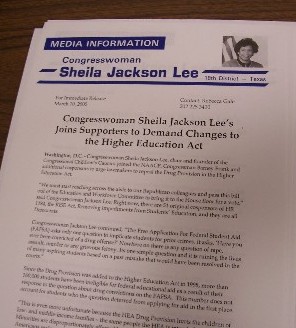Feature:
Drug
Policy
Alliance
Issues
First
Congressional
Drug
Policy
Voter
Guide
2/3/06
Political interest groups across the board issue voter guides, both to educate voters and to highlight their issues. The ACLU does it. The AFL-CIO does it. The NRA does it. The Catholic Church does it. But up until now, no organization working for drug policy reform has done it at the federal level. That changed this week, with the release of "The 2006 Drug Policy Reform Congressional Voter Guide," by the Drug Policy Alliance and its lobbying arm, the Drug Policy Alliance Network (DPAN).
"Rep. Lee has a real commitment to do something in this area," said Lee spokesman Stony Cook. "She has looked at Houston and the nation and the number of African-American men who have had drug problems and are in prison, and she has become an advocate for reform in this body," he told DRCNet. "It's no accident that she has a perfect record with the Drug Policy Alliance because this is a very important issue to her." Rep. Sensenbrenner's office did not respond to a DRCNet request for comment. "We are trying to hold members accountable for the votes and also trying to educate our supporters on where members stand on drug policy reform issues," said Bill Piper, DPA's director for national affairs and the man behind the guide. "We've been getting a lot of e-mails from supporters thanking us for doing it." The voters guide scores each congressperson on what it identified as six key drug reform votes last year. "We picked those six amendments because they were really the only ones to go to House floor votes," Piper said. "One is about states' rights, another is about the deregulation of drug treatment, three are about increased funding for federal programs, and one is about racial profiling. Five out of these six issues could be seen as boosting conservative goals, yet Democrats were overwhelmingly more likely to vote the right way than Republicans." The votes were:
"If you look at the 33 representatives who had perfect scores, all except Ron Paul were Democrats," said DPA's Piper. "If you look at the 70 representatives who voted right on five out of six, all were Democrats except Arizona Republican Jeff Flake and Vermont Independent Bernie Sanders," he said. "On the flip side, while nobody voted the wrong way on all six votes, of the 69 who voted wrong on five, all were Republicans except Scott Matheson from Utah," he told DRCNet. "The contrast is startling. It is clear that Democrats have a better voting record on the whole than Republicans," Piper declared. "Still, three Republicans got our hero award." While the ranking of individual representatives was done strictly by their "correct" voting percentage, when it came to awarding honors, DPAN had to resort to more subjective criteria as well. "We looked at their votes on the amendments, of course, but we also looked to see if they were sponsors or cosponsors of good bills, how good they've been at the committee level, and how outspoken they've been in criticizing the war on drugs," Piper explained. "Take John Conyers. He only voted right on four out of six -- he missed one vote and was wrong on one other -- but that was outweighed by his strong support for four of the bills, all the work he's done in the Judiciary Committee, and his record of speaking out on drug policy." The voter guide is just the beginning of DPA's lobbying effort, which will be undertaken by the group's lobbying arm, the DPAN and D-PAC, the Drug Policy Alliance PAC. "This is phase one of a two-phase plan," said Piper. "The second phase involves giving campaign contributions to members who have good voting records. We'll probably hold fundraisers in Washington and one or two other cities this year. Between the voter guide and the campaign contributions, we're trying to take drug policy to the next level," he said. It would be a first for the national drug policy reform movement. While the Marijuana Policy Project has handed out campaign contributions based on the pot politics of the recipients, no other group has created a federal PAC for drug policy reform in general. "As far as I know, we are the only federal PAC dedicated to supporting candidates critical of the drug war as a whole," said Piper. "We're trying to make drug reform a political force on the Hill."
|

